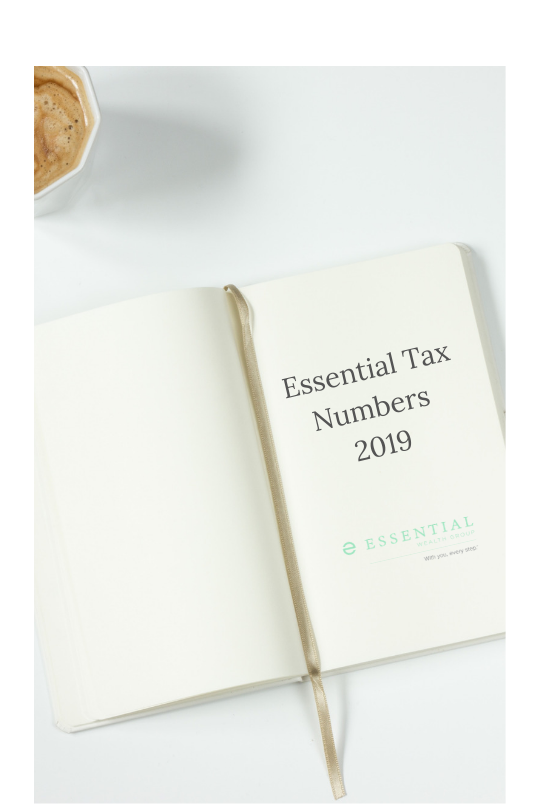Essential Tax Numbers 2019

General Filing Numbers
Low-Interest Loans
The current family loan rate is 2%.
Medical Expenses Threshold
For the 2018 tax year, the maximum is 3% of net income or $2,302, whichever is less. For 2019, the max is 3% or $2,352, whichever is less.
Donation Tax Credits
After March 20, 2013, the first-time donor super credit is 25% for up to $1,000 in donations, for one tax year between 2013 and 2017. This program has now expired.
Basic Personal Amount
2018 - $11,809
2019 - $12,069
(line 300 on your tax return)
Working Tax Filers
Maximum RRSP Contribution Room
18% of your previous year’s earned income to a maximum of:
2018 - $26,230 *Reminder: contributions to be applied to your 2018 tax return must be made by March 1, 2019.
2019 - $26,500
TFSA Contribution Limit
The annual limit for 2019 has been raised from $5,500 to $6,000. The total room available for someone who has never contributed before and has been eligible since TFSA’s were introduced in 2009 is $63,500.
Maximum Pensionable Earnings
2018 - $55,900
2019 - $57,400
*The basic exemption amount remains $3,500
Maximum EI Insurable Earnings
(Federal)
2018 - $51,700
2019 - $53,100
Lifetime Capital Gains Exemption
2018 - $848,252
2019 - $866,912
Home Buyers' Amount
If you purchased a home last year, you may be eligible to claim up to $5,000 of the purchase cost, and get a non-refundable tax credit of up to $750.
Senior/Retiree Filers
Age Amount
This can be claimed if you were 65 years of age or older on December 31, 2018. The maximum amount that can be claimed for 2018 is $7,333 and for 2019, $7,494.
Pension Income Amount
If you reported eligible pension, superannuation or annuity income you may be entitled to claim up to $2,000.
OAS Recovery Threshold - "Clawback"
If your net world income exceeded $75,910 for 2018, you may have to repay part of, or the entire amount of OAS pension collected. This is commonly referred to as the OAS “clawback”.
Filers with Children
Family Caregiver Amount
For 2018, if you have a dependent who is physically or mentally impaired, you may be able to claim up to an additional $2,150 in calculating certain non-refundable tax credits.
Disability Amount
2018 - $8,235 (non-refundable credit), with a supplement up to $4,804 for those under 18 (the amount is reduced if child care expenses are claimed).
Child Disability Benefit
2018 – up to $2,771 (tax-free benefit) for families who care for a child under age 18 with a severe and prolonged impairment in physical or mental functions.
Canada Child Benefit (CCB)
CCB came into effect July 1, 2016. The maximum CCB benefit for 2018 (non-taxable) is $6,496 per child under age 6 and up to $5,481 per child aged 6 through 17. The benefit is based on your family net income.
Universal Child Care Benefit (UCCB)
This benefit was replaced with the Canada Child Benefit (described above) as of July 1, 2016. However, Canadian residents can still apply for previous years if they meet certain conditions, including living with the child and being primarily responsible for the child’s care and upbringing.
Child Care Expense Deduction Limits
The maximum amounts that can be claimed:
$8,000 – for children under age 7
$5,000 – for children aged 7 through 16
$11,000 – for children who are eligible for the disability tax credit
Children's Fitness and Arts Tax Credits
Has been phased out and is gone as of 2017.
As always, it is recommended that you consult with a professional to ensure your taxes are filed accurately to maximize the credits and strategies available to you. The team at Zebroski and Associates completes annual tax returns for many of our clients, a service which is conveniently facilitated through our office. If you would like more information, please do not hesitate to contact us.
Zebroski and Associates is an independent company. Industrial Alliance have no liability for activities outside of HollisWealth.
Source: Staff. "Essential Tax Numbers." Advisor.ca . N.p., 19 Nov. 2018. Web. 20 Nov. 2018.
Posted In: Taxes

